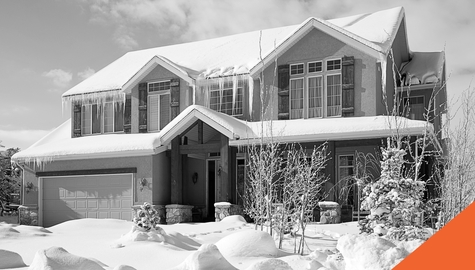A Comprehensive Change of Address Checklist in Canada
Monday, 7 October 2024
So, you’re taking a bold step and moving!
This decision can be exciting and challenging at the same time. Whether you are upsizing, downsizing, moving far away, or just across the street – a change of address is not complete until you update your address with several agencies and services. Our BIG “Change of Address Checklist” for Canada will help you remember all the essential places to update your address. Keep it handy!
THE BIG CHANGE OF ADDRESS CHECKLIST
As you embark on a new adventure or life stage, take advantage of this address change checklist to make sure you update your new address with the following important institutions.
Government Agencies (Federal & Provincial)
If you want to continue receiving tax information, essential communications, and benefit payments, you must inform federal and provincial agencies about your change of address. As part of your change of address checklist, you’ll need to make sure that your new mailing address is known to the government service providers to avoid major headaches when you want to renew your driver’s licence, register motor vehicles, or change your electricity provider.
This list includes all the federal and provincial government offices you should contact.
Federal departments where you must update your address
- Personal tax and direct deposit - Canada Revenue Agency (Personal)
- Business tax information - Canada Revenue Agency (Business)
- Employment Insurance, CPP, Old Age Security - Service Canada
- Immigration, visas, and permits - Immigration, Refugees, and Citizenship Canada
- Boat, Aircraft, and Air Traffic License - Transport Canada
- Firearms License - RCMP
- Voter Registration - Elections Canada
- Canada Savings Bonds Program - Bank of Canada
- Public Service Pay - Public Services and Procurement Canada
- NEXUS Pass - Canada Border Services Agency
- Veteran benefits - Veterans Affairs Canada
- Passport - you can just write it in!
- Post office (they can set up mail forwarding for you!)
Provide your change of address to these Provincial departments
- Provincial ID card
- Change address on driver’s licence
- Health card
- Vehicle registration
Insurance Company or Insurance Broker
As part of your change of address checklist in Canada, you’ll want to make sure that you update address forms with the main insurance providers you have plans with. Whenever you move, your insurance providers will need an updated address in order to accurately calculate premiums, as well as provide you with documentation for billing and claims.
- Auto insurance
- Health insurance
- Home insurance
- Travel insurance
- Life Insurance and living benefits
- Business insurance
Financial Institutions
Your financial institutions should know your new address to protect your money and identity, so make sure you include them in your address change checklist. It is crucial that any sensitive information (account statements and bills, for example) that shows up in the mail will be delivered to your new address. By updating your address, you can prevent identity theft and fraudulent transactions on your accounts; you don’t want your personal details to end up in the wrong hands.
- Banks
- Loan institutions
- Mortgage companies
- Credit card companies
- Private pension boards
- Premium bonds
Utilities & Communication Services
Your utilities are connected to your name and your location, so as part of your address change checklist in Canada, let providers know that you’re moving a few weeks before you move. They will help you disconnect the service in your old home and set it up in your new one.
- Hydro/power provider
- Water provider
- Gas provider
- Cable services
- Landline and cell phone services
- Internet services
Subscription Services & Shopping (Online & In-Person)
When you shop online, especially with subscription services, you must add these businesses to your change of address checklist in Canada to avoid having your items delivered to the wrong address. If you sign up for meal kit deliveries or you have a monthly skincare subscription, these services need to know you have moved. Either update them with your address or cancel the service so you don’t incur unnecessary charges. Many online stores will also need your new billing address on file to process orders.
- Fitness classes and gym membership
- Fashion and beauty
- Food delivery services and meal prep kits
- Magazines, newspapers, etc.
- Streaming services (Netflix, Amazon Prime, etc.)
Medical & Mental Health Facilities
Your healthcare providers should know about your address change for billing information to ensure accuracy for health claims, so remember to add your physician, dentist, and other providers to your change of address checklist. If you are staying in the same area, you might want to stay with your current health care providers. If not, perhaps they can recommend a trusted colleague in your new location.
- Physician
- Dentist
- Pharmacist
- Optometrist
- Physiotherapist, massage therapist, etc.
- Mental healthcare providers
- Veterinarian
- Hospitals and emergency care clinics
Schools and Educational Institutions
If you have children, moving to a new neighbourhood might mean you need to register them at a new school. Contact existing childcare facilities and schools with your change of address.
- Pre-schools
- Day cares
- Elementary schools
- Middle/junior high schools
- High schools
- Scholarship, bursaries, and student assistance programs
- Trade or apprenticeship programs
- Colleges or Universities
Household Service Provider
Inform these household service providers when you move in case you need to cancel their services.
- Home cleaners
- Gardeners
- Repair services
- Accountants
Group Memberships
If you receive regular mail updates from local groups, or they have your billing information on file for donation and tax purposes, let them know you’ve moved so you can stay connected. Here are some of the organizations you could consider adding to your moving/change of address checklist:
- Community groups
- Religious groups
- Cultural associations
- Support groups
- Libraries
Personal Contacts
It might be rare to get a postcard or thank-you card in the mail nowadays, but your friends and family might want to know your new address so they can pop by or send you a wedding invitation. Be careful how you share your new address with your contacts – avoid posting it on social media sites. Instead, add it to your address change checklist to remind yourself to share your new address with the key people in your life, such as:
- Family members
- Friends
- Employers
- Landlords
HOW A CHANGE OF ADDRESS AFFECTS YOUR INSURANCE
When insurers look at your car insurance and property insurance, your postal code dictates many factors that affect your rates. Here are some of the ways your address will impact your insurance costs, which will make it clear why you should add insurance providers to your change of address checklist for Canada.
Frequency of claims in the area: Companies calculate rates by analyzing the statistical likelihood of claims in your area.
Traffic patterns and accident rates: If your new city has low accident rates and quieter streets, your car insurance will tend to be lower.
Commuting distance: Moving closer to work will reduce your commute and work wonders for your car insurance price! However, spending more time commuting on the roads will typically raise your costs.
Parking options: Private driveways and secure garages could earn you a discount on your car insurance.
Crime rate: Areas with fewer break-ins, acts of vandalism, and other property crimes will have more reasonable home and auto insurance premiums.
Proximity to fire stations or hydrants: Being closer to fire services means a faster response time and less fire damage to your home, which keeps your home insurance more affordable.
Proximity to other homes: The closer you are to other houses, the more likely a fire will spread to yours. This can raise the price of your home insurance.
Probability of natural disasters: Some areas are prone to flooding, forest fires, earthquakes, and other natural disasters. The higher the probability of natural disasters, the higher your property insurance premiums will be.
Home size and rebuilding costs: When you move to a new house, the square footage, home value, and estimated rebuilding costs will be different. The higher the estimated cost to rebuild, the higher your home insurance will be.
Phew! You made it. It’s a long list, but with the BIG comprehensive checklist for change of address, you’ll be able to get everything in order and settle into your new home using these tips in no time.
If you are moving, now is the perfect time to shop around for car and home insurance. Start a quote today with a BIG broker to get amazing deals without sacrificing reliable coverage. Find out how much you could save, and get a free home insurance quote.



